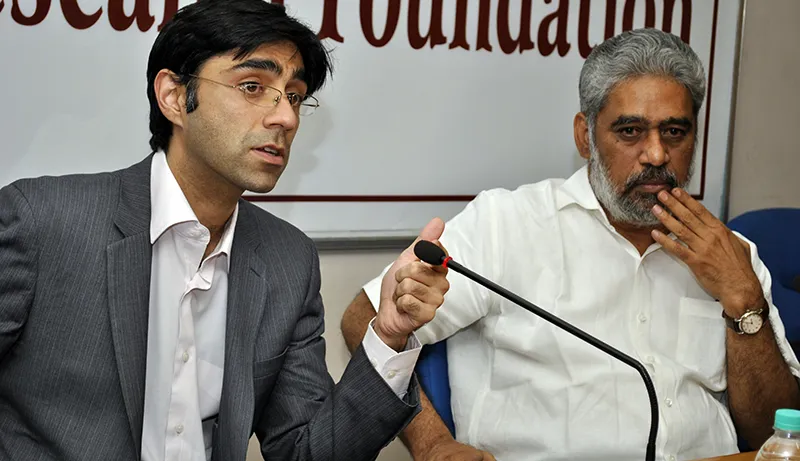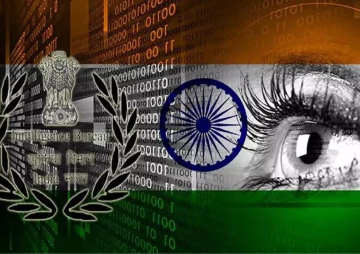Pakistan is now more focussed on its internal issues and this gives India more space to reach a compromise with its neighbour. Pakistan is also no longer in the same competitive position as it was in the 1990, says Dr. Moeed Yusuf, Head of the South Asia Studies Programme at the United States Institute of Peace.

Dr. Moeed Yusuf, Head of the South Asia Studies Programme at the United States Institute of Peace, spoke on the "Current Dynamic in Pakistan and the Future of India-Pakistan Relations" at Observer Research Foundation, Delhi, on August 7, 2014.
The Chair for the session, Dr. C. Raja Mohan, in his introductory remarks said that the relations between India and Pakistan are often affected by the domestic politics in either country. A single incident at home can take away from any progress in the bilateral relationship.
Dr. Moeed Yusuf began his talk by focusing on the internal situation in Pakistan and its consequences on India. According to him, Pakistan over the last seven years can be defined by three basic internal developments which have affected the country’s approach to external affairs. The first development concerns the major domestic institutional contestation between the various pillars of the State, i.e., the Parliament and the Executive, the Judiciary and the Military. Despite being newer than the rest, the Media was also a part of this tussle. In March 2007, the Lawyers’ Movement that began against the erstwhile President Pervez Musharraf shattered the old equilibrium present in the country. This led to a renegotiation amongst the contesting institutions which caused an imbalance in the equilibrium in the country. The Judiciary was the biggest gainer from this renegotiation and demanded more space for itself. The Media became the broker between the various players and, in this way, created its own space. This recalibration has been ongoing since 2007 with the Military gradually having to give up space to the other pillars.
By 2012-13 the non-military players peaked in terms of the space they occupied in the functioning of Pakistan. The Judiciary overextended itself to the point where it began discussing potato and tomato prices and the Parliament and Executive lost popularity due to misgovernance. Laws were being passed on unimportant issues because of the need for active participation in a bid to capture a significant share of the State. Realisation concerning the state of affairs has led to a reverse calibration of this equilibrium. The Military used to control 60 percent of the Government space which has reduced to 40 percent today. This institutional contestation has been positive for Pakistan because of this restructured balance.
The second major development has been in the governance and economic sphere. Under the Pervez Musharraf government there was very little funding and investment in the energy sector. More effort was put into the institutional contestations and governance was assigned secondary priority. The situation was one of State paralysis with stalled bureaucracy and deinstitutionalisation in some sectors.
Dr. Yusuf emphasised that the coming into effect of the 18th Amendment in Pakistan was one of the most positive things for the country in the last five years. According to the Amendment, the Centre gave up some of its powers to the provinces in an attempt to decentralise governance. Due to a lack of resources in the immediate aftermath of the 18th Amendment, the provinces actually began to perform worse than the Centre, however, this is now changing and the end result will be positive.
The last major development mentioned by Dr. Yusuf is the phase of overwhelming violence that began in 2007 following the Lal Masjid incident. He said that the violence taking place in Pakistan is often misunderstood by the outside world as an existential threat to the country caused by insurgency. There is no actual threat of state collapse or insurgent take-over by terrorists in Pakistan. The key problem that the Pakistan State faces is the defence of its citizens on a day-to-day basis. The average day in Pakistan is consumed by immense politicking in the civilian political sphere because of this challenge. The Pakistan Muslim League - Nawaz (PML-N) and Imran Khan’s Pakistan Tehreek-e-Insaf (PTI) are both embroiled in a political contest which may have once again put good governance on the backburner.
Dr. Yusuf went on to add that despite all these internal dynamics Pakistan maintains a positive pattern of growth. The economy has never registered negative growth despite the lack of incoming investors.
These developments have also affected the India-Pakistan relationship. India is no longer a political issue in Pakistan and no political party stands on an anti-India platform. Pakistan is now more focussed on its internal issues and this gives India more space to reach a compromise with its neighbour. Pakistan is also no longer in the same competitive position as it was in the 1990. Currently the country has more domestic worries to address. For India, there is no international pressure to change status quo and India’s rise will continue regardless of a compromise with Pakistan. The difference between the size of India’s economy and Pakistan’s economy is also increasing rapidly, further reducing pressure on India. However, in Pakistan there is a compulsion for a change in status quo because of economic instability and an energy crisis. But, India must keep in mind that no settlement between the neighbours can be grossly unequal.
Dr. Moeed concluded by saying that this is the right time for compromise especially as an unstable and weaker Pakistan would have a negative impact on India as well.
(This report is prepared by Sruthi R., Research Intern, Observer Research Foundation, Delhi)
The views expressed above belong to the author(s). ORF research and analyses now available on Telegram! Click here to access our curated content — blogs, longforms and interviews.




 PREV
PREV

